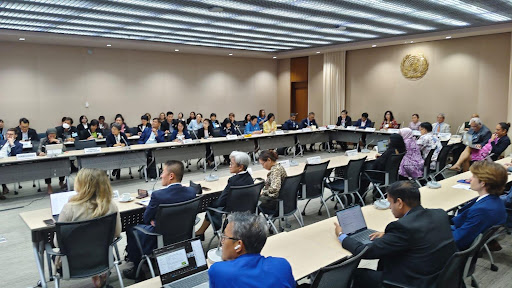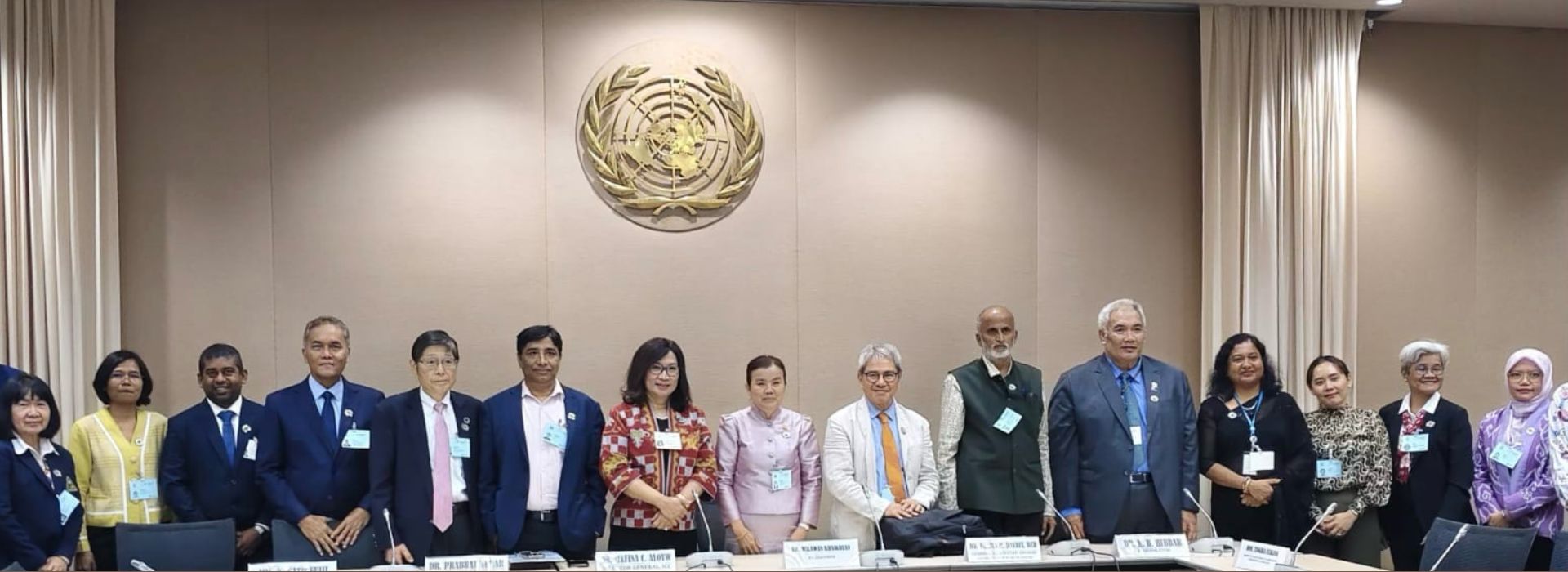In support of sustainable food and energy security programs, as well as climate change mitigation, the International Coconut Community (ICC) hosted a significant Side Event titled "Harnessing the Potential of Coconut for Food and Energy Security: Sustainable Solutions for a Resilient Future". The event, held on April 25, 2025, at Meeting Room A, United Nations Conference Center, Bangkok, Thailand, was part of the 81st session of the UNESCAP Commission.

A total of 133 participants joined, with 68 attending physically at the venue and 65 others participating virtually via Zoom. The participants came from various countries, with the largest number from Indonesia (33 participants, 12 in-person and 21 virtual), followed by Thailand with 30 participants who all attended physically. Other countries such as India, Sri Lanka, Malaysia, the Philippines, Japan, Fiji, France, Australia, Vietnam, Côte d'Ivoire, Kenya, and other Asian and African countries several others also sent participants, both physically and virtually. The participants came from diverse organizations, including government, embassies, international organizations, private sector, universities, and research institutions, represented by government officers, researchers, university lecturers, private sector players, farmers, and journalists.
Also attended at the event H.E. Tingika Elikana, Ministry of Foreign Affairs and Immigration, Cook Islands and Dr. Wilaiwan Kraikruan, Deputy Director-General, Department of Agriculture, Ministry of Agriculture and Cooperative, Governman of Thailand.
The event commenced with the welcoming remarks and event objectives presented by Dr. Jelfina C. Alouw, Director General, ICC. In her remarks Dr. Jelfina addressed that coconut is a multifunctional crop with significant economic, social, and environmental roles, impacting millions worldwide. It contributes to SDGs, like poverty alleviation, food security, and climate action. Despite opportunities, the sector faces challenges like extreme weather and limited infrastructure. Innovation, supportive policies, and investment in research and technology are needed. Coconut products can enhance food security, public health, and climate change mitigation. Expected outcomes include increased awareness, policy integration, and collaborative investment. Strengthening partnerships is crucial for sustainable coconut sector development, improving smallholder farmers' livelihoods and addressing global challenges.

The first session, led by Dr. Fabian Dayrit, Chairman of the ICC Scientific Advisory Committee on Health (SACH), highlighted the various health benefits and nutritional value of coconut. Dr. Dayrit emphasized that coconut is not only a traditional staple food but also contains highly nutritious components that can support public health while contributing to food security stability. He explained that diverse coconut-based processed products, such as coconut oil, coconut milk, and coconut flour, provide sustainable healthy food options.
Following this session, Mr. Masato Fujii, Director of Green Power Development Corporation from Japan, presented the role of coconut as an alternative energy source. The main focus was on the utilization of coconut as a Sustainable Aviation Fuel (SAF). Mr. Fujii illustrated how innovative coconut processing technology can produce environmentally friendly SAF, reducing dependence on fossil fuels in the aviation sector. This is considered crucial for achieving global emission reduction targets in an industry that has historically been difficult to decarbonize.
In the subsequent session, Dr. Hebbar K. Balachandra, Director of the Central Plantations Crop Research Institute (CPCRI), India, underscored the aspect of coconut in climate change mitigation through its carbon sequestration capabilities. As a plantation crop, coconut has the capacity to absorb carbon dioxide, thus potentially providing tradable carbon credits within international schemes. Dr. Hebbar explained the mechanisms and benefits of implementing these carbon credits, while also emphasizing the importance of sustainable management of coconut plantations to optimally contribute to global climate resilience.
 A panel discussion moderated by Dr. Prabhat Kumar, Chairman of the ICC Technical Working Group (TWG), concluded the event with an intensive discussion on the challenges faced by the coconut industry, particularly in ensuring sufficient and stable raw material availability. Participants discussed issues such as climate change, plant pests, and governance that need improvement to build a resilient coconut supply chain. Strategic steps that can be implemented, including technology development, more massive research investment, and international collaboration in the coconut sector, were also discussed.
A panel discussion moderated by Dr. Prabhat Kumar, Chairman of the ICC Technical Working Group (TWG), concluded the event with an intensive discussion on the challenges faced by the coconut industry, particularly in ensuring sufficient and stable raw material availability. Participants discussed issues such as climate change, plant pests, and governance that need improvement to build a resilient coconut supply chain. Strategic steps that can be implemented, including technology development, more massive research investment, and international collaboration in the coconut sector, were also discussed.
This event embodies the commitment of the ICC and all industry stakeholders to ensure that coconut not only remains a source of livelihood for traditional farmers but also transforms into a globally competitive commodity that underpins world food and energy security. With an integrated approach uniting aspects of health, green energy, and climate change mitigation, the ICC hopes to spur innovation and policies that support the sustainable coconut sector, while simultaneously strengthening the industry to be more resilient in facing the dynamics of future changes.

